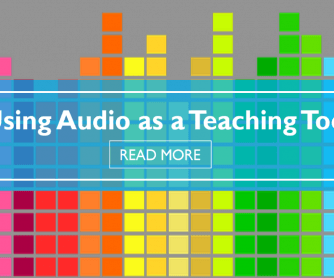
Want to spice up the lessons in your classroom? Try incorporating some audio. From listening to music and spoken word pieces to recording their own voices, their many ways to help students learn while using audio. So pull out the smartphones, plug in the headphones, and have students get to work.
Listening to music
When it comes to using songs in your classroom. you have plenty of options. Students can complete gap fills while listening to songs or create their own gap fill worksheets for their favorite songs. THey can also listen to and watch lyric videos on YouTube, building their language and vocabulary skills while enjoying some fun music. With a smartphone, students have the ability to pause songs, review them, and repeat them as they wish so they can get the language down. In addition to listening to music as part of an activity, you can encourage students to listen to music in English outside of class and discuss some of their favorite songs with their friends.
Listening to podcasts and the radio
Podcasts and radio stations are full of different shows for students to listen to. Many of these shows go beyond music too. For example, students could listen to one of the regular programs on NPR or find a podcast that connects with a topic they are interested in. Students can also listen to the news on the radio or a podcast and make notes about the biggest stories of the day. You can have students listen and write down the gist of what they're hearing or have them focus on more specific meanings as they listen.
If you're looking for interesting podcasts for students, consider some of the following:
- There are some brilliant podcast anecdotes at the award-winning Luke’s English Podcast. Have students listen to one, make notes and then share the information with their partners.
- There are some informative (and quite difficult) professional podcasts from the British Council here . These are great for high level students that are intermediate and above.
- There are also a whole series of Elementary podcasts from the British council with interactive games and activities. You could have your students complete these as homework or as a classroom study time task.
- There are high-level current affairs shows and documentaries to help students learn academic English available through Radio4 Podcasts. Sometimes thought provoking, sometimes funny, Radio 4 makes some of the best radio in the world.
Improving pronunciation
Use the sound recorder feature on a smartphone to help students improve their pronunciation. Give students a quote, short scene, or paragraph to read. As they read, they can record themselves pronouncing the words. Students can then play back their recordings and ask themselves the following questions: Am I happy with my pronunciation? What things did I say wrong? Could I have said any of the words better?
Listening to their own voices is a big help to students. This activity also gives them the opportunity to examine their own mistakes and correct them, an important step in becoming and independent and much more effective language learner.
Interview yourself
Have students download, dictate or make copies of the worksheet Interview and record yourself on your smartphone.
Get students to read through the questions and practise what they are going to say in their own heads. They can also add a few more questions at the end to make it more personal. Ask students to record their interview on their mobile phones. As students listen back to the recording have them think about these things:
- Did you answer the questions completely?
- Were you happy with the grammar you used?
- Do you think you spoke too quickly or slowly?
- What areas in your spoken English could you improve?
This is an especially good activity if students are getting ready for oral exams because it allows them to listen to their mistakes as well as get valuable exam practice.
Remembering Vocab
Some students find it a lot easier to remember words when they say them. Get students to use the sound recorder on their mobile phones to record vocab that they want to learn. You could even give them a list of words to record into their phones that you will test them on during the next class session.
Homework
Many of these activities work well as homework assignments. Make sure students follow up whatever they did by talking about it with their peers or even presenting what they did to the class.
Do you use audio in the classroom? If so, we'd love for you to share your strategies and ideas with us!
P.S. If you enjoyed this article, please help spread it by clicking one of those sharing buttons below. And if you are interested in more, you should follow our Facebook page where we share more about creative, non-boring ways to teach English.








